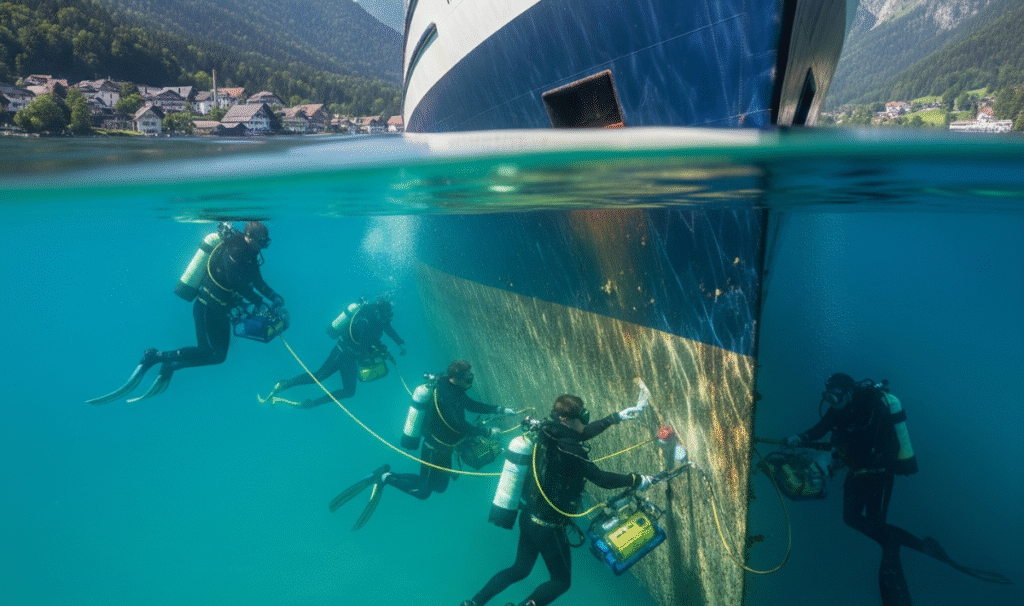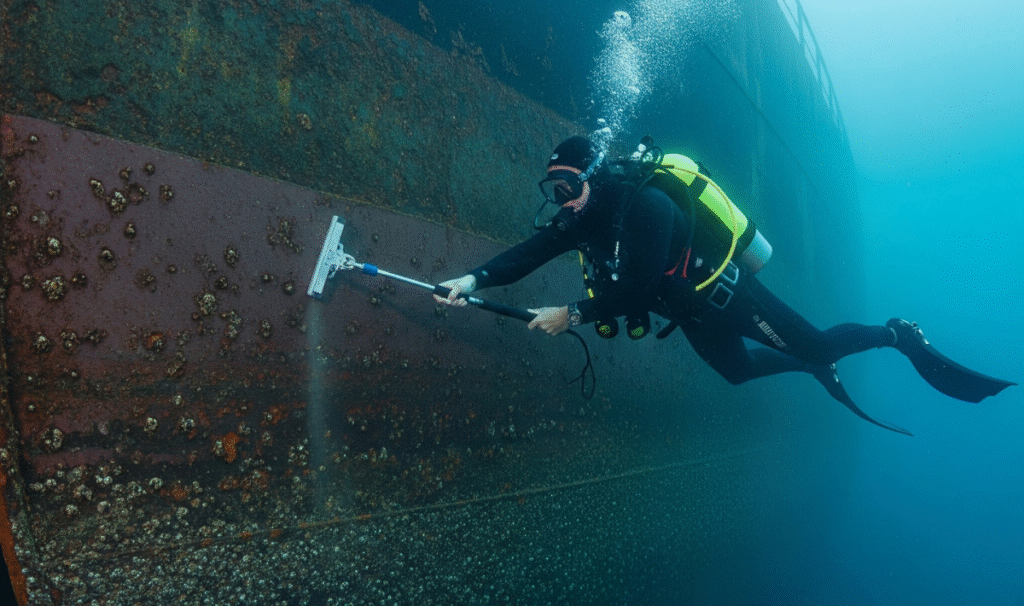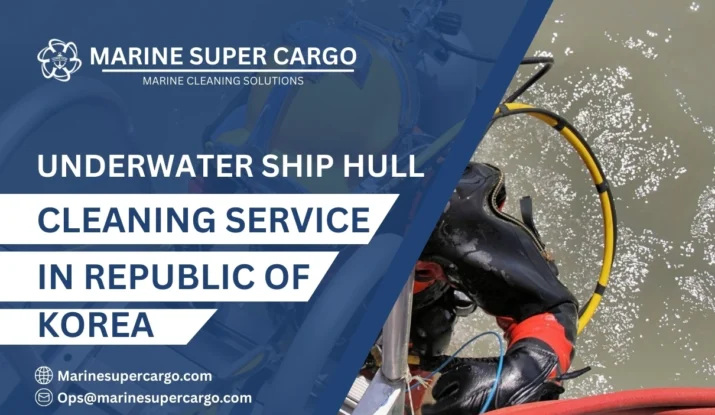The Republic of Korea isn’t just a global leader in shipbuilding—it’s also at the center of one of the busiest maritime trade networks on Earth. From Busan Port, the world’s sixth largest container hub, to Incheon and Ulsan, millions of tons of goods move every year. But here’s a hidden truth: even the sleekest, largest vessels suffer the same enemy—marine biofouling. Barnacles, algae, and mussels attach to ship hulls, turning smooth sailing into energy-draining resistance. That’s why underwater ship hull cleaning in Republic of Korea is more than maintenance—it’s a necessity for efficiency, compliance, and safety.
Imagine driving a brand-new car but never washing it. Over time, dirt thickens, visibility drops, efficiency declines, and performance suffers. Ships aren’t any different—only their “dirt” comes in the form of marine organisms clinging to steel.
In a country where maritime trade accounts for nearly 99% of international cargo transport, hull maintenance directly impacts the economy. This article explores the three key benefits of underwater ship hull cleaning in Republic of Korea, highlighting why it’s not just optional upkeep but a cornerstone of effective shipping operations.
What is Underwater Ship Hull Cleaning in Republic of Korea?
In simple terms, underwater ship hull cleaning is the process of removing biological and mineral growth from a ship’s submerged surfaces.
- Traditional methods involved divers with scrapers and brushes.
- Modern methods use Remotely Operated Vehicles (ROVs), magnetic crawlers, high-pressure water jets, and suction systems.
Global organizations like the International Maritime Organization and the International Marine Contractors Association set standards for safe, effective practices. Compliance ensures that cleaning supports efficiency without harming marine environments—an especially key concern in South Korea’s busy coastal waters.

Fuel Efficiency and Cost Savings
Think of hull fouling like running a marathon in ankle-deep mud—you burn more energy with each step. A fouled hull increases drag, making engines consume more fuel.
In a country like the Republic of Korea, with one of the largest shipping industries, fuel efficiency is non-negotiable. Research shows fouling can raise fuel consumption by 10–40%. For a container vessel docking at Busan, those costs easily climb into millions of dollars annually.
Regular underwater ship hull cleaning in Republic of Korea means:
- Lower fuel consumption—vessels cut through water smoothly.
- Savings on operating costs—fuel takes up a huge chunk of expenses.
- Improved schedules—ships travel faster and avoid delays.
It’s like sharpening a kitchen knife; the same force now goes further with less resistance.
Environmental Protection and Regulatory Compliance
Fuel efficiency doesn’t just mean financial savings—it means environmental wins. Ships are notorious contributors to greenhouse gases, but cleaner hulls lower fuel burn and emissions.
The MARPOL Convention requires strict pollution prevention. South Korea—being a member state—enforces these rules in its ports.
Benefits of eco-compliant hull cleaning include:
- Lower CO₂ and SOx emissions—key to fighting global warming.
- Preventing invasive species transfer—biofouling organisms carried from one sea to another threaten Korean marine ecosystems.
- Alignment with global sustainability goals—ports like Busan are increasingly adopting greener standards, as emphasized by iaphworldports.org.
Thus, underwater ship hull cleaning in Republic of Korea isn’t just about ship efficiency—it’s about protecting the oceans that sustain shipping itself.
Vessel Longevity and Safety
Hull fouling doesn’t just cause drag—it accelerates corrosion and damages painted coatings. Over time, that means expensive steel repairs and shorter vessel lifespans.
Routine underwater ship hull cleaning in Republic of Korea ensures:
- Corrosion resistance—slowing down steel deterioration.
- Longer coating life—antifouling paints perform better when maintained.
- Improved navigation—clean hulls reduce resistance, making docking and navigation at congested South Korean ports safer.
For ship operators, clean hulls mean fewer unexpected breakdowns. For crews, it means safer voyages. For ports, smoother handling reduces accident risks. It’s a multi-layered win.
Hull Cleaning Challenges in Republic of Korea
Like every region, South Korea faces unique hurdles in hull cleaning:
- Marine growth spikes seasonally, especially in warmer months.
- Strict regulations require certified processes to avoid harming local ecosystems.
- Port congestion makes scheduling downtime for cleaning tricky.
Yet, these challenges only highlight why efficient hull cleaning methods and providers are so important.
Technological Innovations in Hull Cleaning
Hull cleaning is transforming rapidly:
- Robotic crawlers equipped with cameras clean consistently and safely.
- Eco-friendly suction systems capture debris, preventing pollution.
- Advanced antifouling coatings extend the time between cleanings.
As showcased by cleanship.co, sustainability and efficiency now go hand in hand. For South Korea, one of the top global shipping nations, adoption of such innovations ensures competitiveness and environmental leadership.
Choosing the Right Service Provider in the Republic of Korea
If you’re planning underwater ship hull cleaning in Republic of Korea, here’s what to look for:
- Certifications from IMO, IMCA, and compliance with MARPOL.
- Local expertise—providers familiar with Korean waters and port regulations.
- Eco-friendly methods that handle biofouling waste responsibly.
- Advanced technology—ROVs, magnetic crawlers, and high-tech brushes outperform manual scrubbing.
Choosing wisely ensures you’re compliant, cost-efficient, and environmentally responsible.

Recap of the 3 Key Benefits
The three fundamental benefits of underwater ship hull cleaning in Republic of Korea are:
- Fuel efficiency and cost savings—lower drag means big financial wins.
- Environmental protection and compliance—support MARPOL, cut emissions, and guard biodiversity.
- Vessel longevity and safety—reduce corrosion, extend lifespan, and ensure safe navigation.
Conclusion
For South Korea—a maritime powerhouse—hull cleaning is not a detail, but a driver of trade. Every barnacle removed from a ship’s hull supports efficiency, safety, and environmental responsibility. Investing in underwater ship hull cleaning in Republic of Korea is like polishing hidden armor—it ensures vessels glide smoothly, safely, and sustainably through global waters.
For ship operators, it’s not just maintenance; it’s a strategy for profit, compliance, and long-term competitiveness.
FAQ:
Q1: How often should ships undergo hull cleaning in Republic of Korea?
Typically every 6–12 months, depending on trade routes and fouling intensity in regional waters.
Q2: Is underwater hull cleaning safe for marine ecosystems?
Yes—if performed under IMO and IMCA standards with eco suction capturing bio waste.
Q3: Can clean hulls really cut emissions significantly?
Absolutely. By boosting fuel efficiency, ships burn less fuel, lowering CO₂ and sulfur emissions.
Q4: Does hull cleaning replace dry docking in South Korea?
No—it complements dry docking by extending coating life and efficiency between major overhauls.
Q5: What’s the most innovative hull cleaning trend in Korea today?
Robotic ROVs and smart antifouling coatings are gaining traction, offering faster and greener cleaning solutions.


